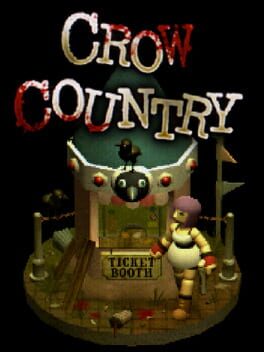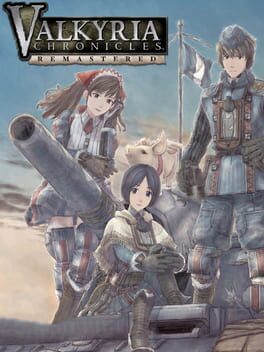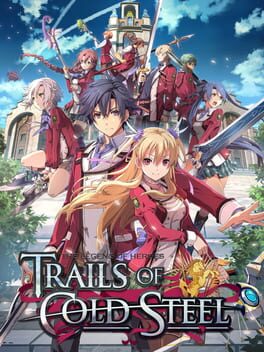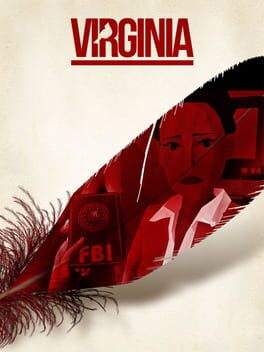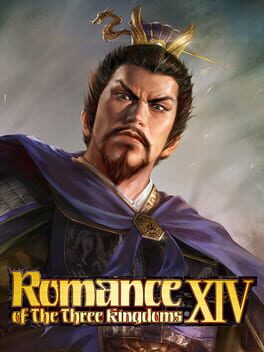katsugarry
2024
A really nice nostalgic throwback to the PS1 era with an art style reminscient in some ways of the original Final Fantasy VII though it obviously also calls back to Resident Evil, and to a lesser extent, Silent Hill. The controls for firing weren't the smoothest, and at times it wasn't always clear how some puzzles were meant to be solved, but it was fun, the story was fine, and the writing was decent. Finished in less than six hours, was only missing the achievement for S rank presumably because I used too many healing items. There is some incentive to replay, but I don't think I'd enjoy it so much--never really have enjoyed repeating content. Soundtrack is nice too, worth playing if you need something fairly light and not too intense.
Valkyria Chronicles is a game that I didn't expect to like at first. I was worried it was going to be too silly, that it was going to be over-the-top. It had been a while since I had really enjoyed a Japanese RPG style game as much as I had done in the late 90s. But this one surprised me.
First, I'll mention some of the negatives. There's this one character who always has one eye closed and it really bugs me. There is a supporting character that is a small pig with wings. There's some fan service bits. It's occasionally very difficult. It's unplayable and ridiculously cheesy with the English voice acting (in my estimation).
There are many positives. I like any game that enables me to form a team of distinct people from a large number of options (in this sense, it scratched my Genso Suikoden itch). It means that, while there are some characters that aren't to my tastes, unless they are part of the main cast, I don't need to suffer them. The characters I put in my team become heroes in my own mind, as I recall times in which they've saved me from almost certainly having to start a level from the beginning again. There is an extensive cast of female characters, with a diverse range of personalities and appearances. It's also worth mentioning that there are quite a few LGBT characters in the game, but they aren't particularly well represented in some cases. The game does have an anime style, but it's very subdued--everything from the colour palatte to the behaviour of the characters is mostly just a bit less in your face than what I've come to expect from modern anime things. The combat system is fairly intuitive and it can be very satisfying when you've developed a strategy for defeating a level with little to no casualties. The psuedo-European setting is a pull for anyone with an interest in historical things. All the details about guns and tanks will no doubt be of interest to people with certain inclinations. The story isn't amazing, but it's simple, and it's effective (and sometimes affecting). It touches on some delicate issues such as racism and slavery, and isn't too tacky about it. Soundtrack is also very nice.
I was so involved in this game for a few months, I went to a themed cafe when the remaster came out on PS4 and there are really chunky art books to buy that flesh out the story, characters and development process. It was a good time. If you enjoy the characters in this game, many of them also make appearances in the sequels on the PSP--so it's worth getting invested in!
First, I'll mention some of the negatives. There's this one character who always has one eye closed and it really bugs me. There is a supporting character that is a small pig with wings. There's some fan service bits. It's occasionally very difficult. It's unplayable and ridiculously cheesy with the English voice acting (in my estimation).
There are many positives. I like any game that enables me to form a team of distinct people from a large number of options (in this sense, it scratched my Genso Suikoden itch). It means that, while there are some characters that aren't to my tastes, unless they are part of the main cast, I don't need to suffer them. The characters I put in my team become heroes in my own mind, as I recall times in which they've saved me from almost certainly having to start a level from the beginning again. There is an extensive cast of female characters, with a diverse range of personalities and appearances. It's also worth mentioning that there are quite a few LGBT characters in the game, but they aren't particularly well represented in some cases. The game does have an anime style, but it's very subdued--everything from the colour palatte to the behaviour of the characters is mostly just a bit less in your face than what I've come to expect from modern anime things. The combat system is fairly intuitive and it can be very satisfying when you've developed a strategy for defeating a level with little to no casualties. The psuedo-European setting is a pull for anyone with an interest in historical things. All the details about guns and tanks will no doubt be of interest to people with certain inclinations. The story isn't amazing, but it's simple, and it's effective (and sometimes affecting). It touches on some delicate issues such as racism and slavery, and isn't too tacky about it. Soundtrack is also very nice.
I was so involved in this game for a few months, I went to a themed cafe when the remaster came out on PS4 and there are really chunky art books to buy that flesh out the story, characters and development process. It was a good time. If you enjoy the characters in this game, many of them also make appearances in the sequels on the PSP--so it's worth getting invested in!
I was looking for a game in the vein of Valkyria Chronicles or Suikoden when I came across recommendations for Trails of Cold Steel (not a great name for a game, I don't think, but then neither are the other two I mentioned). I wanted a character-based JRPG experience with depth, maturity (but not too po-faced), and a good soundtrack. There was a lot I liked about this game, but there were quite a few things I didn't like as well. It's worth noting that this is my first Legend of Heroes game. This review is spoiler free.
To begin with, the music didn't do much for me--the funky music which plays when you are first exploring the school grounds feels a bit jarring, and often a song will be playing for just a bit too long. Sometimes that happens in games and you don't notice, but I noticed here--especially considering how long you spend in an area sometimes. Some of the songs introduced later were a better fit, I felt, although still a bit too repetitive.
This is also a very slow game, sometimes painfully slow--the story moves at a snails pace, and you're given the impression that important things are happening around you, but you're not privy to the details. Around Chapter Six I was really getting fatigued, as every month you go to a new large area, are given some fetch quests and are told to kill a monster on the highway. There is impetus to talk to every NPC you find as they help to build the world, and what they say changes depends on the time of day, and what story events have taken place--you can also talk to them twice on one occasion and they will say something different. This is a curse and a blessing. I haven't played another game which cared so much about making sure every NPC had multiple things to say to you throughout the course of the game. It makes it feel that the world is alive, that things are happening in the world beyond what you see, and that's great. It feels like a world filled with people who have lives, a world much bigger than you. This is all good. But then I have the self-inflicted curse of wanting to hear what everyone has to say at every time of day and after every story event, and it becomes a bit draining, especially when the majority of people don't actually have that much of interest to say. When I reached Chapter Six, and there was a new area filled with new NPCs and I had been playing the game for 50 hours or so, I kind of started rushing through, talking to less people, exploring less, and missed out on a few items for achievements and weapon upgrades later.
This game is set in a school environment, and so the majority of major characters are under the age of 18. It's a Japanese style school in many ways, in terms of the way it is organised, and resembles Persona to some extent as a result. The friendship links you can build with members of your party also resemble Persona to a certain degree, but you don't go through every single day of school life, just select days once per month and on one of those days you can choose to spend time with a select number of your party members. There is a lot of good writing in the game, some of it is very cleverly done, and I feel that the localization team did a very good job of keeping it consistent and believable. As a Glasgow boy, I was a very big fan of the character Becky, whose Kansai dialect had been given a very authentic Glaswegian translation. The English voice acting is also good, which isn't something I often find myself saying about dubbed JRPG games.
There is unfortunately a lot of heavy-handed sexualisation of these teenagers, and a lot of the female characters seem to be more of a male fantasy of what girls might be like as opposed to having personalities. There is a lesbian student who is a sex pest, regular commentary on the bodies of the girls (some of whom are between 13 and 15), insinuations of incest, as well as a number of lecherous male characters, such as a grandfather who is lusting after his granddaughter. There are no male gay characters, male homosexuality is treated as an embarrassing topic for men, and is the butt of a running joke related to the school's literature club. The majority of this stuff seemed gratuitous, superfluous, and as someone who teaches high school students, a bit uncomfortable. An unfortunate stain on an otherwise well-realised world, with a number of very likeable characters.
I don't really care about combat in games like this, I put it on easy, could win most battles very quickly, but even then there were still a few too many for my tastes--especially near the end. The combat is very intuitive however, and easy to get to grips with. I enjoyed doing link attacks with my teammates. I don't really know that it was ever explained why there are so many monsters on the road, but maybe this has been touched on somewhere in the series' long history.
I did really like just how much interaction there was between party members. I had a very good sense of who they were and was never left wanting for interactions--unlike in say, Final Fantasy XV. It helped to make the relationships feel real and to give me a stronger sense of the world in which they lived in, and I feel like this was the strength of the game. There is a large cast of characters, even beyond the school environment, and you do feel that there is a world here which has history and where intriguing things are happening, even if I sometimes felt like there were some obvious ideas which weren't being considered. But the world feels big, it feels well-realised. The game does have an anime feel, many characters have colourful hair, lots of sweat beads and exclamation marks, but with the exception of one or two characters, it isn't too grating.
It's also worth mentioning that visually the game is not stunning. Some of the animation is very janky and sometimes a bit silly, and I think the game was glitching a few times with regards to where the camera and characters were situated. But it does a good enough job with the style and manages to build a sense of place with what it has.
To conclude, there was a lot I really liked about this game and a lot I didn't like. But overall it helped to scratch an itch, and by-and-large delivered what I was looking for--so I was able to see past the issues. So for that reason I'd recommend it.
To begin with, the music didn't do much for me--the funky music which plays when you are first exploring the school grounds feels a bit jarring, and often a song will be playing for just a bit too long. Sometimes that happens in games and you don't notice, but I noticed here--especially considering how long you spend in an area sometimes. Some of the songs introduced later were a better fit, I felt, although still a bit too repetitive.
This is also a very slow game, sometimes painfully slow--the story moves at a snails pace, and you're given the impression that important things are happening around you, but you're not privy to the details. Around Chapter Six I was really getting fatigued, as every month you go to a new large area, are given some fetch quests and are told to kill a monster on the highway. There is impetus to talk to every NPC you find as they help to build the world, and what they say changes depends on the time of day, and what story events have taken place--you can also talk to them twice on one occasion and they will say something different. This is a curse and a blessing. I haven't played another game which cared so much about making sure every NPC had multiple things to say to you throughout the course of the game. It makes it feel that the world is alive, that things are happening in the world beyond what you see, and that's great. It feels like a world filled with people who have lives, a world much bigger than you. This is all good. But then I have the self-inflicted curse of wanting to hear what everyone has to say at every time of day and after every story event, and it becomes a bit draining, especially when the majority of people don't actually have that much of interest to say. When I reached Chapter Six, and there was a new area filled with new NPCs and I had been playing the game for 50 hours or so, I kind of started rushing through, talking to less people, exploring less, and missed out on a few items for achievements and weapon upgrades later.
This game is set in a school environment, and so the majority of major characters are under the age of 18. It's a Japanese style school in many ways, in terms of the way it is organised, and resembles Persona to some extent as a result. The friendship links you can build with members of your party also resemble Persona to a certain degree, but you don't go through every single day of school life, just select days once per month and on one of those days you can choose to spend time with a select number of your party members. There is a lot of good writing in the game, some of it is very cleverly done, and I feel that the localization team did a very good job of keeping it consistent and believable. As a Glasgow boy, I was a very big fan of the character Becky, whose Kansai dialect had been given a very authentic Glaswegian translation. The English voice acting is also good, which isn't something I often find myself saying about dubbed JRPG games.
There is unfortunately a lot of heavy-handed sexualisation of these teenagers, and a lot of the female characters seem to be more of a male fantasy of what girls might be like as opposed to having personalities. There is a lesbian student who is a sex pest, regular commentary on the bodies of the girls (some of whom are between 13 and 15), insinuations of incest, as well as a number of lecherous male characters, such as a grandfather who is lusting after his granddaughter. There are no male gay characters, male homosexuality is treated as an embarrassing topic for men, and is the butt of a running joke related to the school's literature club. The majority of this stuff seemed gratuitous, superfluous, and as someone who teaches high school students, a bit uncomfortable. An unfortunate stain on an otherwise well-realised world, with a number of very likeable characters.
I don't really care about combat in games like this, I put it on easy, could win most battles very quickly, but even then there were still a few too many for my tastes--especially near the end. The combat is very intuitive however, and easy to get to grips with. I enjoyed doing link attacks with my teammates. I don't really know that it was ever explained why there are so many monsters on the road, but maybe this has been touched on somewhere in the series' long history.
I did really like just how much interaction there was between party members. I had a very good sense of who they were and was never left wanting for interactions--unlike in say, Final Fantasy XV. It helped to make the relationships feel real and to give me a stronger sense of the world in which they lived in, and I feel like this was the strength of the game. There is a large cast of characters, even beyond the school environment, and you do feel that there is a world here which has history and where intriguing things are happening, even if I sometimes felt like there were some obvious ideas which weren't being considered. But the world feels big, it feels well-realised. The game does have an anime feel, many characters have colourful hair, lots of sweat beads and exclamation marks, but with the exception of one or two characters, it isn't too grating.
It's also worth mentioning that visually the game is not stunning. Some of the animation is very janky and sometimes a bit silly, and I think the game was glitching a few times with regards to where the camera and characters were situated. But it does a good enough job with the style and manages to build a sense of place with what it has.
To conclude, there was a lot I really liked about this game and a lot I didn't like. But overall it helped to scratch an itch, and by-and-large delivered what I was looking for--so I was able to see past the issues. So for that reason I'd recommend it.
2016
A very beautiful, atmospheric game which will be of particular interest to Twin Peaks fans. Great soundtrack which is perhaps a little on the nose sometimes! Doesn't take long for a single playthrough, but the one brief playthrough I did really stuck with me after the fact. If you don't like walking simulators, this probably isn't for you.
I'm a long time fan of the series, starting with ROTK IV. But other than that iteration, I probably played ROTK 10 and 11 the most. The former of the two is an almost role-playing style experience where you choose one officer and decide what they do day-to-day. The latter of those two follows the ruler style of play, in which you control your kingdom and make decisions to govern it. ROTK 14 is of the latter sort.
At its core this is a turn-based map painting game. The artwork of the officers is beautiful, the music is sweeping, but extremely repetitive and ill-fitting for the era of the game. The gameplay in this iteration is perhaps overly simple. Most turns are simply spent rewarding officers with cash (a term which was actually used to describe a type of money in ancient China, by the by) to keep them loyal and just agreeing to the suggestions of my officers. In battle, you tell your officers what you want them to do that turn and the AI executes it for you, which often has unfortunate results. The opposition AI seems much more reactive during the combat phase than those following my commands! Doesn't have multiplayer and suffers for that.
It's not a bad game per se, it's just not very interesting, especially if you don't already have an interest in the series or time period. So for that reason I won't recommend it.
At its core this is a turn-based map painting game. The artwork of the officers is beautiful, the music is sweeping, but extremely repetitive and ill-fitting for the era of the game. The gameplay in this iteration is perhaps overly simple. Most turns are simply spent rewarding officers with cash (a term which was actually used to describe a type of money in ancient China, by the by) to keep them loyal and just agreeing to the suggestions of my officers. In battle, you tell your officers what you want them to do that turn and the AI executes it for you, which often has unfortunate results. The opposition AI seems much more reactive during the combat phase than those following my commands! Doesn't have multiplayer and suffers for that.
It's not a bad game per se, it's just not very interesting, especially if you don't already have an interest in the series or time period. So for that reason I won't recommend it.
Europa Universalis IV is a historical simulation / grand strategy war game of intimidating complexity. Even as I encroach upon 500 hours played, there are still aspects of the game that I am learning about and have not yet mastered. It is a game that continues to challenge me many years after having first played it, and never gets boring. The main issues in terms of gameplay tend to be AI behaviour (where they sent their troops, sudden changes of attitude), and RNG (i.e., the randomness of attitudes of nations towards one another at game start, for example). This can very much shape the way in which your game plays out. The AI decision making also seems to be very player-centric, which can be frustrating at times.
It's difficult to review games like this, which change so drastically throughout the years of iteration and expansion. There have been times throughout the games lifespan when the AI was unable to deal with its economy appropriately and would spiral into debt, becoming completely useless as allies and drastically impacting any attempted playthroughs. In the earliest iterations of the game, it will have been much scarcer in terms of flavour for many nations (unique events, decisions, missions, and so on), and will have been lacking in many of the interesting and complex systems which have become a central part of the current experience of the game. And so any given review will be reacting to a snapshot of the game in a particular state, including this one.
I am very happy with where the game is now, especially in terms of how much flavour there is for such a large number of nations you can choose from, and in terms of how fun the various systems are to engage with, but it was not always like this. I am not happy, however, with how much money it has cost for it to get to this point, all of the DLC and content packs. Nowadays it is possible to purchase a monthly subscription which gives you access to everything, but that's little solace to people who have spent inordinate sums on everything as it came out. Especially considering that it only really amounts to bells and whistles. Why wasn't the subscription model available from the beginning? (This is a rhetorical question; I know the answer.) Paradox is often called out on its payment model for these games, and says little of nothing about it. Lucky for them I really enjoy the games they make.
In the course of playing this game, I have learned so much about the world, different cultures, religions, their history, various historical events and individuals. It has inspired me to do courses of learning and to start studying languages, to read books and watch certain movies/TV shows/documentaries. I can truly say that playing Europa Universalis IV has been formative for my appreciation and understanding of the wider world. And that isn't something I can usually say about games. This, the current state of the game, and the subscription model which gives access to years of content, are the main reasons why I can recommend it.
It's difficult to review games like this, which change so drastically throughout the years of iteration and expansion. There have been times throughout the games lifespan when the AI was unable to deal with its economy appropriately and would spiral into debt, becoming completely useless as allies and drastically impacting any attempted playthroughs. In the earliest iterations of the game, it will have been much scarcer in terms of flavour for many nations (unique events, decisions, missions, and so on), and will have been lacking in many of the interesting and complex systems which have become a central part of the current experience of the game. And so any given review will be reacting to a snapshot of the game in a particular state, including this one.
I am very happy with where the game is now, especially in terms of how much flavour there is for such a large number of nations you can choose from, and in terms of how fun the various systems are to engage with, but it was not always like this. I am not happy, however, with how much money it has cost for it to get to this point, all of the DLC and content packs. Nowadays it is possible to purchase a monthly subscription which gives you access to everything, but that's little solace to people who have spent inordinate sums on everything as it came out. Especially considering that it only really amounts to bells and whistles. Why wasn't the subscription model available from the beginning? (This is a rhetorical question; I know the answer.) Paradox is often called out on its payment model for these games, and says little of nothing about it. Lucky for them I really enjoy the games they make.
In the course of playing this game, I have learned so much about the world, different cultures, religions, their history, various historical events and individuals. It has inspired me to do courses of learning and to start studying languages, to read books and watch certain movies/TV shows/documentaries. I can truly say that playing Europa Universalis IV has been formative for my appreciation and understanding of the wider world. And that isn't something I can usually say about games. This, the current state of the game, and the subscription model which gives access to years of content, are the main reasons why I can recommend it.
2022
SIGNALIS starts by following an android named Elster searching industrial sites for a lost human companion. Along the way, reality proves unreliable as identity, physics and recollection fracture. The world depicted is a totalitarian interplanetary regime which ruthlessly exploits human and synthetic beings. Elster served alongside a human companion called Ariane onboard a doomed spacecraft called the Penrose which seemingly became lost to deep space. Much remains enigmatic regarding promises made between the two amidst shared trauma and the true nature of the psychic force called "bioresonance”. But tender bonds endure despite inexorable forces eroding the integrity of their bodies and memories.
SIGNALIS is a also a love letter to classic survival horror titles Silent Hill and Resident Evil, on a surface level. But it goes beyond cheaply referencing them in crafting its own unique world and narrative, which has been the subject of much subsequent discussion in the form of video essays and discussions online. The true nature of the story is intentionally ambiguous on some levels, and so those looking for a cut-and-dry linear tale which puts all its cards on the table might be frustrated. But for those who derive satisfaction in delving into the symbolism, decoding strange puzzles, and considering questions about personal identity, what's real and unreal--you may well enjoy SIGNALIS's enigmatic, intricately crafted story. Though it's not necessary to do so in order to enjoy the haunting atmosphere, soundtrack, and familiar, retro style survival horror gameplay.
I've been thinking about this game for a long time since finishing it, and since it's simple enough to finish it in well under ten hours, I even played through it again (which is rare for me!). So for these reasons, I can happily recommend SIGNALIS.
SIGNALIS is a also a love letter to classic survival horror titles Silent Hill and Resident Evil, on a surface level. But it goes beyond cheaply referencing them in crafting its own unique world and narrative, which has been the subject of much subsequent discussion in the form of video essays and discussions online. The true nature of the story is intentionally ambiguous on some levels, and so those looking for a cut-and-dry linear tale which puts all its cards on the table might be frustrated. But for those who derive satisfaction in delving into the symbolism, decoding strange puzzles, and considering questions about personal identity, what's real and unreal--you may well enjoy SIGNALIS's enigmatic, intricately crafted story. Though it's not necessary to do so in order to enjoy the haunting atmosphere, soundtrack, and familiar, retro style survival horror gameplay.
I've been thinking about this game for a long time since finishing it, and since it's simple enough to finish it in well under ten hours, I even played through it again (which is rare for me!). So for these reasons, I can happily recommend SIGNALIS.
